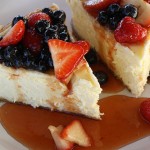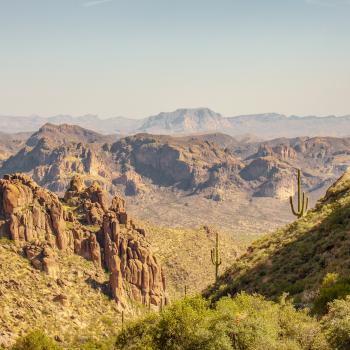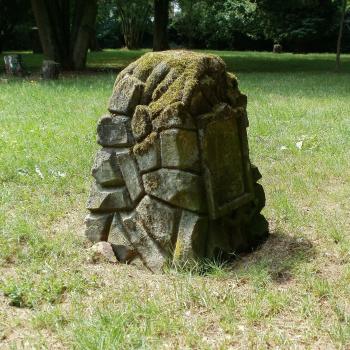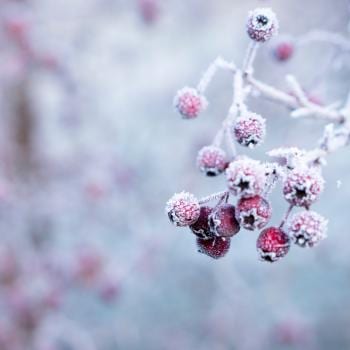I finished the second page of a devotional scrapbook I’m working on. I know nothing about scrapbooking; this is merely my first attempt at grasping a craft I can use for the spirits. An immanent faith does not shame pretty keepsakes, right?
The scrapbook is for one of the Four Gods that have opened themselves to me: the Clarene. In the book she is called the ‘highest and foremost of the gods dwelling Westward’ (which here refers to the otherworld land that overlays with our own, the Westernlands, that the Clarene herself created). She, as most gods, has many names. She is the Orchard-Picker, the singer, one of two Sisters, the Lion Mother, the Chimera Maker, the Book Hoarder, the Land Herself, the King-Maker, the City Herself, and more. She is, in a way, the progenitor of the other three gods. Her origins are foggy and obscured at this point, and perhaps not a secret she will reveal to me.
She was the last of the Four Gods to come to me. I had searched for her name from the spirits and prayed endlessly for her to reveal herself – she was always at the edges, always just out of sight, always just beyond touch. When she came, she was like thunder and rode atop a giant dark red horse, and I cried her name into the dark of a dream. She was a storm given flesh. She was violence and danger and when she touched me I broke for I had never felt such love in my life.
I began working on her book first because she made it clear the book was to be hers and also because the Clarene is associated most strongly with our realm, that earthy manifest place. That is not to say that the other gods are not immanent, but the Clarene presides over the dirt and stone of this world. And she teaches an important lesson, one of the biggest in the Otherfaith: choice/consent.
One of the first things the Clarene taught me, after crashing into my life, was that she chooses, every day, to be involved with humanity. She doesn’t need us. She will exist without us. But she wants to be involved with us. This is a choice she makes. She offers us that sweet, enticing fruit, and she asks us what we shall do with it.
the Clarene doesn’t need us, but she wants to be involved with us. That is powerful. While it could be easy to attribute some altruistic motive – turn her into some ‘pure’ figure of ‘goodness’ – that is hardly the situation. She gains, from what we give her. She is definitely a god of return and reciprocity. She gives to us and sustains us that we may give back to her. It could be easy to say that our gifts don’t matter, but that would be a fundamental misunderstanding of our own worth in her eyes. And, no doubt, she loves extravagance. (“Bake me bread. Learn how to brew tea and coffee for me. You will learn the art of beauty.” – so on and so forth.) You do not toss your scraps to this Girl-King. We give sweet herbs and smoke and candies with full knowledge that the Clarene could craft such gifts and more for herself.
But there is a sacredness in giving gifts. It would be inaccurate to say that ‘it is the thought that counts’, because that isn’t how the Otherfaith or most polytheistic faiths work – put in the effort, make a good offering, be generous – but it is also inaccurate to assume that the more extravagant the better. the Clarene is about choice. What do we choose to give her? What do we craft from our hands to give to this Girl-God?*
We sing our praises to her. Our voices reach new heights. We bleed for her. Our written word can be a gift to her. We dance for her. Our arts can be a holy devotion. And each of these weaves together into a cloth for her to wear, one of many beautiful shawls for her to carry, and she shapes us into a story to tell in the future. She smears our lips and fingers with ink and blood. She tosses flour in our faces. She resides with us in our kitchens and in our offices, and when we speak her name she whispers in our ear, “Create, create, create.”
She does not need us. She has crafted a world from her bones and blood and hair that will be sustained, regardless of if we interact with her. But if we do, she gives us great gifts, and she holds us in her hands and says, “I choose this.” She will crash into our lives and teach us to be strong, and she will thunder into us and hold out her fruit and ask, “Will you take it? Will you give me your own gift?”
And, oh glorious night-clad Girl-God, oh highest of the Four Gods who dwell in the West, oh god of ink and earth, she offers us the chance to learn our own gifts. She asks and asks, and she teaches us those great lessons of both a ringing ‘no’ and a singing ‘yes’. And I am ever grateful I placed my hand in hers and said, “Yes, yes, yes.”
*I do hope to write on the reason the two ‘female’ gods of the Otherfaith are called Girl-Gods, Girl-Kings, and Gods rather than goddesses or queens, but I am unsure if Patheos would be the appropriate place to write on such or if it would be of interest to many people. The reason is both because that is what the gods want and the titles are a challenge to how we approach femininity and gender in modern US culture.
(That lesson of choice, and how it permeates the entire Otherfaith, informs us to not compel or force belief or devotion. The Four Gods do not want to force our interaction. As much as I may want people to worship and interact with these gods, that is a choice each individual must make for themselves. The praises of these gods should be sung by those that want to sing.)
















